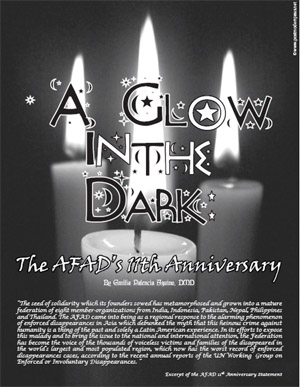
“The seed of solidarity which its founders sowed has
metamorphosed and grown into a mature federation of eight
member-organizations from India, Indonesia, Pakistan, Nepal, Philippines
and Thailand. The AFAD came into being as a regional response to the
alarming phenomenon of enforced disappearances in Asia which debunked the
myth that this heinous crime against humanity is a thing of the past and
solely a Latin American experience. In its efforts to expose this malady
and to bring the issue to the national and international attention, the
Federation has become the voice of the thousands of voiceless victims and
families of the disappeared in the world’s largest and most populated
region, which now has the worst record of enforced disappearances cases,
according to the recent annual reports of the UN Working Group on Enforced
or Involuntary Disappearances. “
Excerpt of the AFAD 11th Anniversary Statement
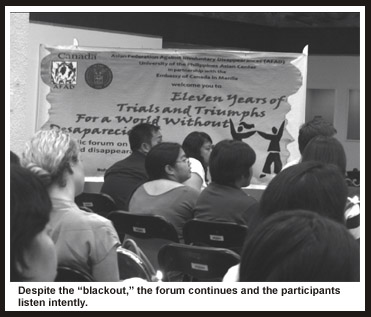 4 June 2009 - A five-minute twister hitting the
electric post at the University of the Philippines (UP) grounds suddenly
darkened the Bulwagang Sala’am of the UP Asian Center, Diliman, Quezon
City, where a public forum on the phenomenon of enforced disappearances in
the Philippines was being held. I do not know if nature meant something
about bringing darkness to the event. Suddenly, darkness came when
testimonies of families of the disappeared were sharing their pain, their
agonizing moments with the uncertain loss of their loved ones and the
difficult journey of becoming strong again. While on the other side of the
room, this “ blackout” clicked just when a lawyer, a human rights advocate
in the Philippine House of Representatives who had been closely involved
in the passage of the anti-disappearance bill signed his name on the
registration form as an attendee of the AFAD’s forum and its 11th
anniversary commemoration, dubbed, “Eleven Years of Trials and Triumphs
Towards a World Without Desaparecidos.”
4 June 2009 - A five-minute twister hitting the
electric post at the University of the Philippines (UP) grounds suddenly
darkened the Bulwagang Sala’am of the UP Asian Center, Diliman, Quezon
City, where a public forum on the phenomenon of enforced disappearances in
the Philippines was being held. I do not know if nature meant something
about bringing darkness to the event. Suddenly, darkness came when
testimonies of families of the disappeared were sharing their pain, their
agonizing moments with the uncertain loss of their loved ones and the
difficult journey of becoming strong again. While on the other side of the
room, this “ blackout” clicked just when a lawyer, a human rights advocate
in the Philippine House of Representatives who had been closely involved
in the passage of the anti-disappearance bill signed his name on the
registration form as an attendee of the AFAD’s forum and its 11th
anniversary commemoration, dubbed, “Eleven Years of Trials and Triumphs
Towards a World Without Desaparecidos.”
Not dazed with unlucky timing, the organizers ensured
the continuation of the forum. Hon. Rene Sarmiento of the Commission on
Elections, spontaneously presented the Writ of Amparo and the Writ of
Habeas Data sans his powerpoint presentation. What could be more
interesting to hear from Commissioner Sarmiento were the facts that there
are legal safeguards protecting our basic right to life, liberty and
security and that no amount of reason can explain the commission of gross
and systematic human rights violations in Asia. Not even in saving a
nation’s sovereignty or invoking state security can a human rights
violation like enforced disappearance be justified. The writs of Amparo
and Habeas Data are judicial remedies available to any person whose right
to life, liberty and security is threatened and violated. These tools are
recently availed of by the families of victims of enforced disappearances
to determine the fate of their disappeared loved ones and to seek
accountability so that justice can be meted out.
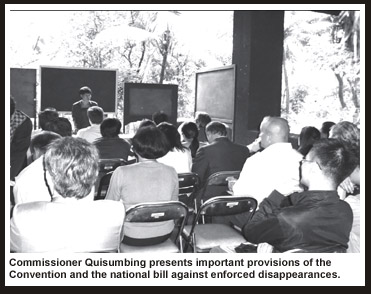 On the issue of the UN Convention for the Protection of
All Persons From Enforced Disappearance and the Philippine House Bill
5886, i.e., the Anti-Enforced Disappearance bill, the Federation
appreciates the significant contribution of the Commission on Human Rights
(CHR) through Commissioner Cecilia Rachel Quisumbing in expounding the
salient provisions of the said international treaty and the bill. For the
CHR, both instruments are necessary to prevent the recurrence of enforced
disappearances and to stop impunity. Furthermore, Honorable Quisumbing
stated that all concerned governments must ratify this international
treaty and enact an enabling mechanism criminalizing enforced
disappearances so that pains caused by enforced disappearance will soon
finally end.
On the issue of the UN Convention for the Protection of
All Persons From Enforced Disappearance and the Philippine House Bill
5886, i.e., the Anti-Enforced Disappearance bill, the Federation
appreciates the significant contribution of the Commission on Human Rights
(CHR) through Commissioner Cecilia Rachel Quisumbing in expounding the
salient provisions of the said international treaty and the bill. For the
CHR, both instruments are necessary to prevent the recurrence of enforced
disappearances and to stop impunity. Furthermore, Honorable Quisumbing
stated that all concerned governments must ratify this international
treaty and enact an enabling mechanism criminalizing enforced
disappearances so that pains caused by enforced disappearance will soon
finally end.
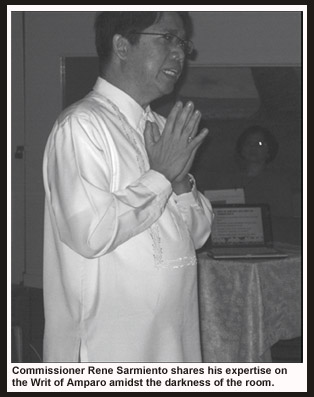 Reactions from the religious group and the academe bolstered the AFAD’s
existence for eleven years and inspired its much-needed sustainability
beyond 11 years in view of the continuing crime of enforced
disappearances. Fr. Junvic Diolata, Co-Executive Secretary of the
Association of Major Religious Superiors (AMRSP) cited the AFAD’s
important position vis-avis the campaign landscape for human rights. He
recognized the Federation as a bulwark of support for victims of human
rights violations which enjoys visible esteem and support from various
agencies, both government and private sectors alike. Serving the
marginalized for a long time, Fr. Junvic shared about the AMRSP’s project,
the “Daluyan,” a channel and a haven for the victims of repression – those
who are harassed and intimidated, whose rights are trampled upon and are
victimized by arrest, detention and all forms of violence.
Reactions from the religious group and the academe bolstered the AFAD’s
existence for eleven years and inspired its much-needed sustainability
beyond 11 years in view of the continuing crime of enforced
disappearances. Fr. Junvic Diolata, Co-Executive Secretary of the
Association of Major Religious Superiors (AMRSP) cited the AFAD’s
important position vis-avis the campaign landscape for human rights. He
recognized the Federation as a bulwark of support for victims of human
rights violations which enjoys visible esteem and support from various
agencies, both government and private sectors alike. Serving the
marginalized for a long time, Fr. Junvic shared about the AMRSP’s project,
the “Daluyan,” a channel and a haven for the victims of repression – those
who are harassed and intimidated, whose rights are trampled upon and are
victimized by arrest, detention and all forms of violence.
From the academe, analyzing the technicalities of the
anti-disappearance law, Professor Edgardo Dagdag spoke about subjective
links with cases of enforced disappearance through his college buddies in
UP, Hermon Lagman, classmate and batch mate with whom he shared many
experiences from 1964 to 1966 when both were Political Science students
and Jessica Sales, his faculty colleague at the Department of Social
Sciences, College of Social Sciences and Humanities, UP, Los Baños,
Laguna. Professor Dagdag confessed that he is still grieving for them. He
acknowledged the government’s commitment to comply with the procedural and
substantive requirements of the country’s treaty obligations and nine
other core human rights conventions of which the Philippines is a state
party. However, the legislature has kept quiet on fast-tracking the
passage of anti-disappearance bill and instead, prioritized other
political agenda like charter change through the Constitutional Assembly.
In his concluding observations, Professor Dagdag said that it is only with
a law prohibiting and penalizing enforced disappearances in the
Philippines could the victims and their families gather some hopes for
adequate and impartial investigations, followed by immediate punishment of
perpetrators as well as reparation. Additionally, he expected more public
debates to be held regarding HB 5886 so that it could be made acceptable
to as many sectors in Philippine society (including the ranks of soldiers
and policemen) as possible.
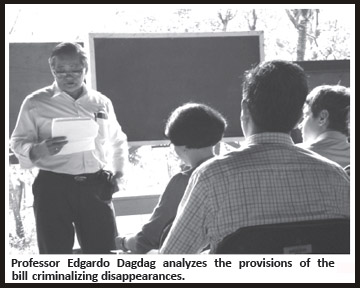 Just when the lights at the
Bulwagang Sala’am returned, Dean Aileen
Baviera of the UP Asian Center capsulated the whole forum. In a nutshell,
she spoke about the deprivations the families of victims of enforced
disappearance are enduring up to the point when these families have been
victimized themselves. Moreover, she put enforced disappearance in the
context where basic respect for human dignity and tolerance for diversity
on political views are not upheld and promoted. She further emphasized
fundamental issues like the need to combat apathy coupled with the fear
that is synonymous with enforced disappearance. For the “surfaced
disappeared,” or a person who disappeared and came back alive, the past
agony could indeed cause him or her to induce a self- administered
anesthesia in order to let go of the excruciating pain. Wide indifference
among those who are not directly hit by this human-made disaster would
reflect the kind of state and society we are in, Dean Baviera further
noted. Support for and response to enforced are a multi-sectoral exercise
from the churches, academe, human rights organizations, the diplomatic
community and the families of victims. They, including some government
officials, all share the common objectives of ensuring law enforcement and
law-making. She finally noted that there is no lack of action in
addressing the crime of enforced disappearance both in the local and
international fronts.
Just when the lights at the
Bulwagang Sala’am returned, Dean Aileen
Baviera of the UP Asian Center capsulated the whole forum. In a nutshell,
she spoke about the deprivations the families of victims of enforced
disappearance are enduring up to the point when these families have been
victimized themselves. Moreover, she put enforced disappearance in the
context where basic respect for human dignity and tolerance for diversity
on political views are not upheld and promoted. She further emphasized
fundamental issues like the need to combat apathy coupled with the fear
that is synonymous with enforced disappearance. For the “surfaced
disappeared,” or a person who disappeared and came back alive, the past
agony could indeed cause him or her to induce a self- administered
anesthesia in order to let go of the excruciating pain. Wide indifference
among those who are not directly hit by this human-made disaster would
reflect the kind of state and society we are in, Dean Baviera further
noted. Support for and response to enforced are a multi-sectoral exercise
from the churches, academe, human rights organizations, the diplomatic
community and the families of victims. They, including some government
officials, all share the common objectives of ensuring law enforcement and
law-making. She finally noted that there is no lack of action in
addressing the crime of enforced disappearance both in the local and
international fronts.
Towards the end of the forum, through a token of
gratitude, expressed in the form of a plaque of appreciation, the
Federation expressed its never-ending gratitude to the Canadian Embassy in
Manila, through Mr. Mark Seniuk, the Second Secretary, which sponsored the
event. An equal manifestation of gratitude was given to the UP Asian
Center that co-sponsored this significant event, through Dean Baviera.
The activity concluded with anniversary rites where the
disappeared from different countries were remembered through a
kaleidoscope of photos splashed on screen. Mr. Joey Faustino a brother of
a disappeared accommodated upon instant request, the facilitation of the
11th anniversary ritual. With lighted candles, participants read a number
of solidarity messages from various parts of the globe. The most
heart-warming of which was the message of Mr. Santiago Corcuera,
Chairperson of the UN Working Group on Enforced or Involuntary
Disappearances who called from Mexico a few minutes before the forum
started (please see full text of his solidarity message on p.58).
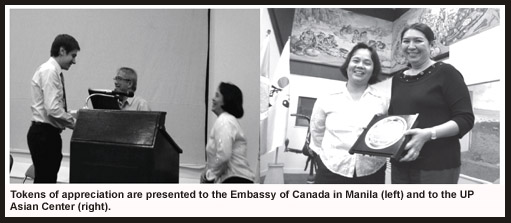
“Despite the efforts by government and civil society,
enforced disappearances continue throughout the world. These acts violate
a range of human rights, including the right to security, right to a fair
trial and right to a family life. Civil society, including a free and
independent media, human rights defenders, and NGOs such as the Asian
Federation Against Involuntary Disappearances are essential elements in
the fight to preserve fundamental human rights and end enforced
disappearances,” stated Mr. Mark Seniuk in his special message.
How could we be in a sad mood in the darkness of the
venue while the program was progressing, when we could hear the loud
voices and saw the tall presence of our friends led by the families of
victims of enforced disappearance, human rights organizations, the
academe, diplomats, churches, supportive individuals, government agencies
and other NGOs? The strength of the solidarity is in itself a glow in the
dark. The darkness of the night of the disappeared, however, always gives
us a tincture of sadness, as Joey Faustino concluded the event with the
reading of his poem, “ Whispering to My Kuya Gerry, ” to wit:
“ …T’was you, my brother,
they bruised and battered, but
so was I
Time will have to heal the
wounds of a now mystified and
muddled life.
Think I will ever get over the stupor of this
unexpected event,? asked I…”.
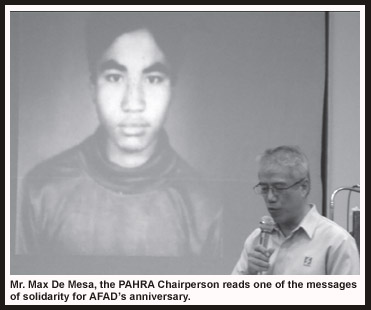 Yet, amidst this dark night, the bright stars of solidarity give us the
much-needed hope that one day, truth and justice will emerge triumphant.
On the occasion of its 11th anniversary, the Federation simply glowed in
the dark because of the presence of friends and supporters, the flaming
courage of the families of the victims, the unwavering stance against all
forms of human rights violations and the openness for diversity of actions
against the crime of enforced disappearance vis-à-vis the climate of
impunity. Lest we forget, the glow in the dark was and will always be made
possible through the guidance of the desaparecidos, whose spiritual
presence, is like a shadow that would never ever leave us.
Yet, amidst this dark night, the bright stars of solidarity give us the
much-needed hope that one day, truth and justice will emerge triumphant.
On the occasion of its 11th anniversary, the Federation simply glowed in
the dark because of the presence of friends and supporters, the flaming
courage of the families of the victims, the unwavering stance against all
forms of human rights violations and the openness for diversity of actions
against the crime of enforced disappearance vis-à-vis the climate of
impunity. Lest we forget, the glow in the dark was and will always be made
possible through the guidance of the desaparecidos, whose spiritual
presence, is like a shadow that would never ever leave us.
To close, may I share with you the following
composition of Mrs. Edith Burgos as she shared her reflections on the
disappearance of her son, Jonas.
This is how it is among us families of
victims of enforced disappearance. One
moment we are ‘normal’ doing what we are
doing, then the next moment, something
touches the heart and triggers an assortment
of emotions. . . then we are dazed into stillness,
tortured by thoughts of our missing.
It seems just like yesterday when the
family was shocked by the abduction of
Jonas. The hundred and one depths, lows
and extremes of rollercoaster-like emotions
remain fresh. The pain, the fears, the sorrow
still are present, but through the days, weeks,
months, years, we have been given the grace
to develop new eyes. . . much like sight of the
heart and not the vision of our eyes.

Emilia P. Aquino is a dentist by profession with a
long engagement in the provision of direct health services to victims of
human rights violations such as political detainees, victims of
demolitions in urban-poor communities and workers on strike. She has
worked with the Medical Action Group, Inc. (MAG) as an education officer
and presently the Administrative Officer of the AFAD.

 4 June 2009 - A five-minute twister hitting the
electric post at the University of the Philippines (UP) grounds suddenly
darkened the Bulwagang Sala’am of the UP Asian Center, Diliman, Quezon
City, where a public forum on the phenomenon of enforced disappearances in
the Philippines was being held. I do not know if nature meant something
about bringing darkness to the event. Suddenly, darkness came when
testimonies of families of the disappeared were sharing their pain, their
agonizing moments with the uncertain loss of their loved ones and the
difficult journey of becoming strong again. While on the other side of the
room, this “ blackout” clicked just when a lawyer, a human rights advocate
in the Philippine House of Representatives who had been closely involved
in the passage of the anti-disappearance bill signed his name on the
registration form as an attendee of the AFAD’s forum and its 11th
anniversary commemoration, dubbed, “Eleven Years of Trials and Triumphs
Towards a World Without Desaparecidos.”
4 June 2009 - A five-minute twister hitting the
electric post at the University of the Philippines (UP) grounds suddenly
darkened the Bulwagang Sala’am of the UP Asian Center, Diliman, Quezon
City, where a public forum on the phenomenon of enforced disappearances in
the Philippines was being held. I do not know if nature meant something
about bringing darkness to the event. Suddenly, darkness came when
testimonies of families of the disappeared were sharing their pain, their
agonizing moments with the uncertain loss of their loved ones and the
difficult journey of becoming strong again. While on the other side of the
room, this “ blackout” clicked just when a lawyer, a human rights advocate
in the Philippine House of Representatives who had been closely involved
in the passage of the anti-disappearance bill signed his name on the
registration form as an attendee of the AFAD’s forum and its 11th
anniversary commemoration, dubbed, “Eleven Years of Trials and Triumphs
Towards a World Without Desaparecidos.” On the issue of the UN Convention for the Protection of
All Persons From Enforced Disappearance and the Philippine House Bill
5886, i.e., the Anti-Enforced Disappearance bill, the Federation
appreciates the significant contribution of the Commission on Human Rights
(CHR) through Commissioner Cecilia Rachel Quisumbing in expounding the
salient provisions of the said international treaty and the bill. For the
CHR, both instruments are necessary to prevent the recurrence of enforced
disappearances and to stop impunity. Furthermore, Honorable Quisumbing
stated that all concerned governments must ratify this international
treaty and enact an enabling mechanism criminalizing enforced
disappearances so that pains caused by enforced disappearance will soon
finally end.
On the issue of the UN Convention for the Protection of
All Persons From Enforced Disappearance and the Philippine House Bill
5886, i.e., the Anti-Enforced Disappearance bill, the Federation
appreciates the significant contribution of the Commission on Human Rights
(CHR) through Commissioner Cecilia Rachel Quisumbing in expounding the
salient provisions of the said international treaty and the bill. For the
CHR, both instruments are necessary to prevent the recurrence of enforced
disappearances and to stop impunity. Furthermore, Honorable Quisumbing
stated that all concerned governments must ratify this international
treaty and enact an enabling mechanism criminalizing enforced
disappearances so that pains caused by enforced disappearance will soon
finally end. Reactions from the religious group and the academe bolstered the AFAD’s
existence for eleven years and inspired its much-needed sustainability
beyond 11 years in view of the continuing crime of enforced
disappearances. Fr. Junvic Diolata, Co-Executive Secretary of the
Association of Major Religious Superiors (AMRSP) cited the AFAD’s
important position vis-avis the campaign landscape for human rights. He
recognized the Federation as a bulwark of support for victims of human
rights violations which enjoys visible esteem and support from various
agencies, both government and private sectors alike. Serving the
marginalized for a long time, Fr. Junvic shared about the AMRSP’s project,
the “Daluyan,” a channel and a haven for the victims of repression – those
who are harassed and intimidated, whose rights are trampled upon and are
victimized by arrest, detention and all forms of violence.
Reactions from the religious group and the academe bolstered the AFAD’s
existence for eleven years and inspired its much-needed sustainability
beyond 11 years in view of the continuing crime of enforced
disappearances. Fr. Junvic Diolata, Co-Executive Secretary of the
Association of Major Religious Superiors (AMRSP) cited the AFAD’s
important position vis-avis the campaign landscape for human rights. He
recognized the Federation as a bulwark of support for victims of human
rights violations which enjoys visible esteem and support from various
agencies, both government and private sectors alike. Serving the
marginalized for a long time, Fr. Junvic shared about the AMRSP’s project,
the “Daluyan,” a channel and a haven for the victims of repression – those
who are harassed and intimidated, whose rights are trampled upon and are
victimized by arrest, detention and all forms of violence. Just when the lights at the
Bulwagang Sala’am returned, Dean Aileen
Baviera of the UP Asian Center capsulated the whole forum. In a nutshell,
she spoke about the deprivations the families of victims of enforced
disappearance are enduring up to the point when these families have been
victimized themselves. Moreover, she put enforced disappearance in the
context where basic respect for human dignity and tolerance for diversity
on political views are not upheld and promoted. She further emphasized
fundamental issues like the need to combat apathy coupled with the fear
that is synonymous with enforced disappearance. For the “surfaced
disappeared,” or a person who disappeared and came back alive, the past
agony could indeed cause him or her to induce a self- administered
anesthesia in order to let go of the excruciating pain. Wide indifference
among those who are not directly hit by this human-made disaster would
reflect the kind of state and society we are in, Dean Baviera further
noted. Support for and response to enforced are a multi-sectoral exercise
from the churches, academe, human rights organizations, the diplomatic
community and the families of victims. They, including some government
officials, all share the common objectives of ensuring law enforcement and
law-making. She finally noted that there is no lack of action in
addressing the crime of enforced disappearance both in the local and
international fronts.
Just when the lights at the
Bulwagang Sala’am returned, Dean Aileen
Baviera of the UP Asian Center capsulated the whole forum. In a nutshell,
she spoke about the deprivations the families of victims of enforced
disappearance are enduring up to the point when these families have been
victimized themselves. Moreover, she put enforced disappearance in the
context where basic respect for human dignity and tolerance for diversity
on political views are not upheld and promoted. She further emphasized
fundamental issues like the need to combat apathy coupled with the fear
that is synonymous with enforced disappearance. For the “surfaced
disappeared,” or a person who disappeared and came back alive, the past
agony could indeed cause him or her to induce a self- administered
anesthesia in order to let go of the excruciating pain. Wide indifference
among those who are not directly hit by this human-made disaster would
reflect the kind of state and society we are in, Dean Baviera further
noted. Support for and response to enforced are a multi-sectoral exercise
from the churches, academe, human rights organizations, the diplomatic
community and the families of victims. They, including some government
officials, all share the common objectives of ensuring law enforcement and
law-making. She finally noted that there is no lack of action in
addressing the crime of enforced disappearance both in the local and
international fronts.
 Yet, amidst this dark night, the bright stars of solidarity give us the
much-needed hope that one day, truth and justice will emerge triumphant.
On the occasion of its 11th anniversary, the Federation simply glowed in
the dark because of the presence of friends and supporters, the flaming
courage of the families of the victims, the unwavering stance against all
forms of human rights violations and the openness for diversity of actions
against the crime of enforced disappearance vis-à-vis the climate of
impunity. Lest we forget, the glow in the dark was and will always be made
possible through the guidance of the desaparecidos, whose spiritual
presence, is like a shadow that would never ever leave us.
Yet, amidst this dark night, the bright stars of solidarity give us the
much-needed hope that one day, truth and justice will emerge triumphant.
On the occasion of its 11th anniversary, the Federation simply glowed in
the dark because of the presence of friends and supporters, the flaming
courage of the families of the victims, the unwavering stance against all
forms of human rights violations and the openness for diversity of actions
against the crime of enforced disappearance vis-à-vis the climate of
impunity. Lest we forget, the glow in the dark was and will always be made
possible through the guidance of the desaparecidos, whose spiritual
presence, is like a shadow that would never ever leave us.